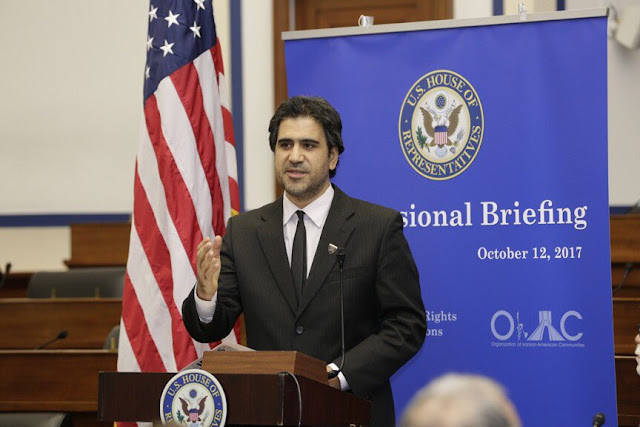By Dr. Majid Rafizadeh
Iran is ratcheting up its threats again. But this time the warnings are emanating from the top leader of the regime.
In addition, Supreme Leader Ali Khamenei, who has the final say in Iran’s domestic and foreign policies, is shrewdly directing his threats toward two separate issues: The region’s oil exports and Tehran’s nuclear activities.
With respect to Iran’s nuclear program, Khamenei said he has instructed authorities to be prepared to increase the capacity of the country’s uranium enrichment in case the Joint Comprehensive Plan of Action (JCPOA), also known as the Iran nuclear deal, collapses.
Since US President Donald Trump withdrew from the agreement and announced the re-imposition of sanctions on Iran, the other signatories — France, Germany, the UK, Russia and China — have been attempting to save the deal and address five additional demands made by Khamenei in response to Washington’s decision.
The head of the Atomic Energy Organization of Iran, Ali Akbar Salehi, a close adviser to Khamenei, is also backing his supreme leader’s stance. He warned: “Instead of building this factory in the next seven or eight years, we built it during the negotiations but did not start it…Of course, the (supreme leader) was completely informed and we gave him the necessary information at the time. And now that he has given the order, this factory has started all of its work.”
Any scholar or policy analyst who has studied Iran’s nuclear file and its acts of defiance since the 1990s will be aware that the Iranian regime most likely has always had nuclear ambitions beyond peaceful intent or civilian purposes.
The other side of Khamenei’s dual approach includes threatening the oil shipments of other countries in the region. He stated at a gathering of Iranian diplomats and officials from the Foreign Ministry that “if Iran’s oil export is blocked, no other country in the region will export oil either.”
But why is Khamenei adopting such a two-pronged approach and issuing serious threats against the region and global powers? First of all, although Iran boasts that it does not need the US to be part of the nuclear deal, the supreme leader is showing signs of concern about the decision by Washington to withdraw from it.
As the Iranian regime hemorrhages billions of dollars on its militias, proxies, terror groups and the Assad regime, Tehran is desperate for extra revenues.
Dr. Majid Rafizadeh
Tehran is worried that the re-imposition of the sanctions, due in early August and November, will inflict significant damage on the country’s economy. This will subsequently endanger the hold on power by the ruling mullahs, and affect the budget of the Revolutionary Guard Corps.
Furthermore, Khamenei is attempting to pressure the international community by showing he fully backs similar remarks and threats made by other top Iranian officials. President Hassan Rouhani recently warned that if other countries do not buy oil from Iran, no other Gulf nations will be allowed to ship oil.
He said: “The Americans have claimed they want to completely stop Iran’s oil exports. They don’t understand the meaning of this statement because it has no meaning for Iranian oil not to be exported while the region’s oil is exported.”
Rouhani escalated his threat by stating: “If you can do such a thing, do it and see the result.”
Secondly, Khamenei is trying to project the message that Iranian officials across the political spectrum are united. On the hard-line side, Mohammed Ali Jafari, commander of the Revolutionary Guards, was quoted by the semi-official Tasnim news agency as declaring: “We will make the enemy understand that either everyone can use the Strait of Hormuz or no one.”
On the moderate side, although threats were previously absent from the discourse of Rouhani’s administration, the landscape has shifted. Even Foreign Minister Javad Zarif recently announced that Iran is prepared to “vigorously” resume its nuclear enrichment program. He added: “We have put a number of options for ourselves and those options are ready, including options that would involve resuming at a much greater speed our nuclear activities.”
Khamenei is playing a tactical and political game with world powers. With concerted efforts — through political posturing, blackmailing tactics, tough rhetoric, ultimatums and the addition of absurd extra demands to their list — Iran’s leaders, including Khamenei, have been attempting to impose significant pressure on the world powers to secure additional concessions and preserve the relief from economic sanctions that was granted in the nuclear deal.
As the Iranian regime hemorrhages billions of dollars on its militias, proxies, terror groups and the Assad regime, Tehran is desperate for extra revenues. Khamenei is under significant pressure and showing signs of concern as the dates for the re-imposition of US sanctions approach. This is indeed a ripe environment for the EU and other world powers to pressure Tehran into altering its destabilizing behavior in the region and, more importantly, renegotiate the terms of the nuclear deal to ensure the Iranian regime cannot pursue its nuclear ambitions or acquire nuclear weapons.
•
Dr. Majid Rafizadeh is a Harvard-educated Iranian-American political scientist. He is a leading expert on Iran and US foreign policy, a businessman and president of the International American Council.
Twitter: @Dr_Rafizadeh
This article was first
published by arabnews




Comments
Post a Comment